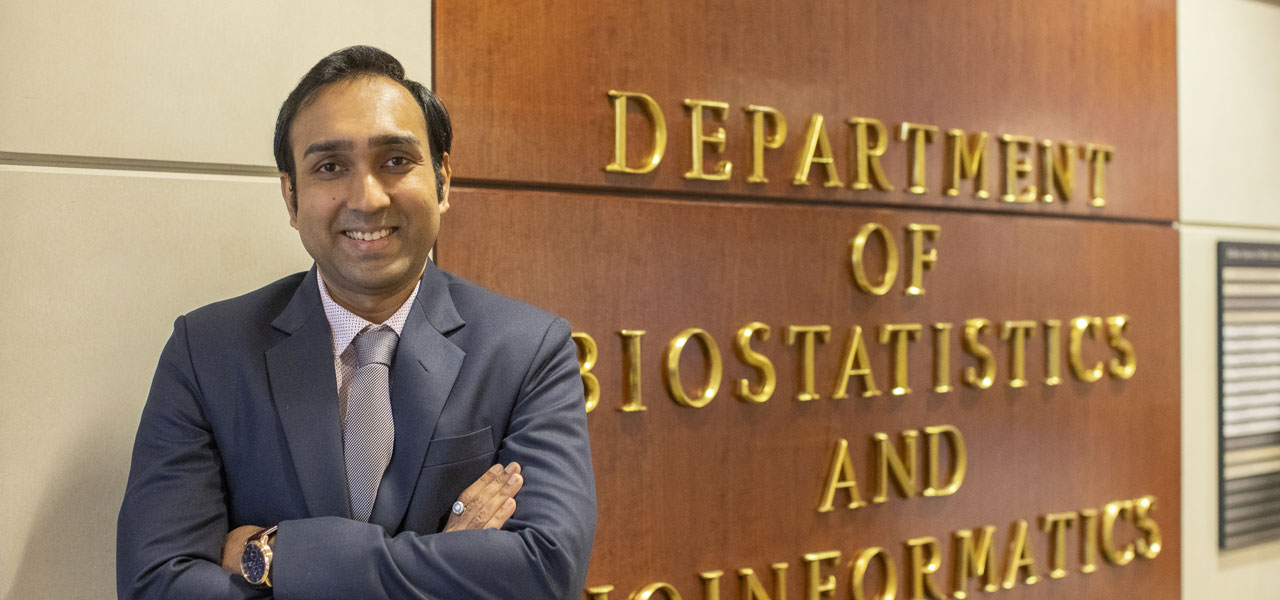
Assistant Professor, Department of Biostatistics
Director of the Data Analytics and Biostatistics Core, Emory Department of Medicine
“If you’re looking for a challenge, if you’re looking for discovery, and if you’re ready to explore the unknown, come to Emory and do research in biostatistics. It’s a thrilling experience. It’s not always easy, but it’s sure worth your time.”
Suprateek Kundu works at the intersection of statistics, machine learning, computer science, imaging, and genomics to tackle major public health problems, particularly those affecting the brain. Over the past several years, his research has looked closely at neurological imaging in an attempt to predict mental disorders like Alzheimer’s, post-traumatic stress disorder, and major depressive disorder.
“I love biostatistics because it allows me to apply powerful mathematical and statistical tools to real-world biomedical problems,” he says. “It’s the best of both worlds. It allows me to pursue my passion in developing mathematical and modeling techniques with the core motivation to do some greater good in society.”
Kundu fuses sources from multiple imaging modalities, such as structural imaging and functional magnetic resonance imaging, to determine how and when these changes are happening and how these different changes to the brain affect or perhaps trigger various mental disorders. He is also combining genetic information with brain imaging to obtain deeper insights into the progression of mental disorders.
“My goal is to be able to take the imaging data from the brain, calculate summary statistics, and develop neuroimaging biomarkers from the imaging data to be able to predict various disorders.”
Kundu and his colleagues have found that if researchers use information derived from structural brain imaging to guide the estimation of functional connectivity using functional imaging data, that the brain networks obtained through functional data could be more reproducible. His lab also showed that you can really do a good job predicting a clinical phenotype or mental disorder using brain networks, which could help patients and practitioners make better informed decisions about mental health treatment.
The mysteries of the human brain have informed much of Kundu’s public health journey. When he was young, Kundu watched his grandfather succumb to a form of dementia at a time when little information was known. He experienced firsthand what effects an illness like Alzheimer’s can have not only on an individual, but on an entire family.
“I wanted to make a difference. Whatever skills I have, whatever contributions I make, I feel privileged to be able to do that.”
Kundu received his bachelor’s in statistics from Presidency College in Kolkata, India; trained at the world-renowned Indian Statistical Institute for his master’s; completed his PhD in biostatistics at UNC Chapel Hill with an emphasis on Bayesian methods; and conducted postdoctoral research at Texas A&M and MD Anderson before coming to Rollins in 2014. Though he had long been interested in network-based tools, it wasn’t until coming to Rollins that he saw the connection between brain imaging studies and the previous work he had been doing.
Most recently, he’s been interested in investigating shape analysis, or the ways in which brain shapes of people with a mental disorder change as the disease progresses. In time, he hopes to develop shape analysis-based tools and functional data-based tools in brain imaging problems to help improve mental health predictions, treatment, and care moving forward. Kundu’s research in statistical methods for neuroimaging has led to promising findings that have resulted in a 5-year $2.1 million R01 grant from the National Institute of Mental Health (of which he serves as principal investigator). Recently, he was also the recipient of the Young Statistical Scientist Award by the International Indian Statistical Association and is one of the youngest scientists to have received this award.
Outside of the lab, Kundu shares his passion for discovery and research with Rollins students. He teaches one of the core courses for the PhD program in biostatistics and engages with students working with him on research projects through the Emory Center for Biomedical Imaging Statistics and Emory Department of Medicine’s Data Analytics and Biostatistics Core. He also serves on the PhD admissions committee and as a thesis advisor for the department.
“If you’re looking for a challenge, if you’re looking for discovery, and if you’re ready to explore the unknown, come to Emory and do research in biostatistics. It’s a thrilling experience. It’s not always easy, but it’s sure worth your time. It will define you for the rest of your career and the rest of your life,” he says. “As faculty, we are ready to support you, nurture you, and guide you. ”

